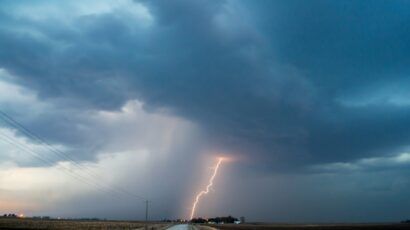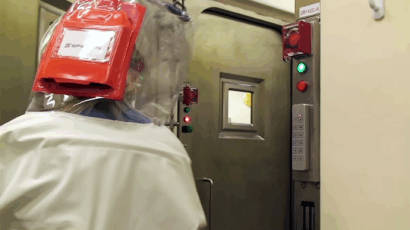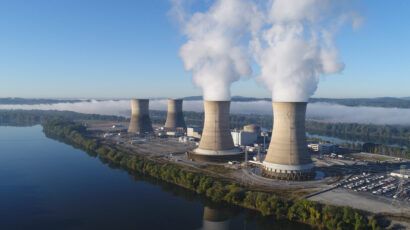The United States just might be Iran’s favorite new nuclear supplier
By Nick Gillard | April 28, 2015
For more than 30 years, Iran has purchased goods for its nuclear program largely from the shadows. Sanctions and an increasingly constrictive global nuclear supply regime have left it little other option. So Iran has built a clandestine global network of front companies and used it to obtain the key goods Tehran needs to keep its centrifuges running and reactor construction on track.
With the framework agreement agreed in Lausanne recently, all this may change. According to the US State Department, one of the agreement’s provisions creates a dedicated procurement channel for Iran’s nuclear program. This channel will "monitor and approve, on a case-by-case basis, the supply, sale, or transfer to Iran of certain nuclear-related and dual-use materials and technology," a US State Department press release on the agreement says. President Obama has described the channel as being run by a "procurement committee."
That’s more exciting than it sounds. This provision will open a legal trade line to most aspects of Iran’s nuclear program for the first time in years. Like Michael Corleone in The Godfather, Part III, Iranian nuclear procurement is finally going legitimate. It’s a sea change for the way Iran’s nuclear supply chain works, and several questions have already been posed about how this channel will function and who will oversee it.
The most interesting of these questions, perhaps, is just who will supply Iran the goods it needs to keep its nuclear program running.
The AQ Khan network is no longer taking calls. Perhaps Russia? They built Iran’s sole nuclear power plant at Bushehr, and Tehran inked a provisional deal late last year with Moscow for eight more power reactors. Moscow’s first-mover advantage may not last, though, now that Iran’s nuclear program has officially come in from the cold; the lengthy delays and safety concerns associated with Russia’s work at Bushehr will make Iran think twice if other options become available to it.
Big-ticket items like power reactors are one thing that Iran will probably seek via this new, legitimate trade channel. But the procurement committee envisaged by the framework agreement is likely to have to deal far more regularly with smaller, but equally important, items: dual-use, nuclear-related consumables.
Take the various widgets that keep Iran’s centrifuges spinning. Centrifuges operate only with the assistance of a network of dual-use infrastructure, some parts of which need regular replacement. Pressure transducers, for example, which monitor the flow of uranium hexafluoride gas in centrifuge cascades, need to be frequently swapped out due to the corrosive nature of their operating environment.
These dual-use goods are made and sold by private companies, rather than by states. It is private companies that Iran will most likely want to buy them from.
And surprisingly, it might be American companies that will fill the role of seller.
Some history is warranted to explain the oddness of this situation. It was America that provided Iran its first nuclear reactor in the 1960s, under the auspices of the Atoms for Peace program. The US nuclear industry had plans in the following decade to build Iran a network of nuclear power plants. The Ford administration even thought that Iran might one day host a regional reprocessing plant for spent nuclear fuel.
The Islamic revolution—or, to be precise, the 444-day-long detention of American embassy staff that followed—put an end to this happy nuclear coupling. Indeed, over the next two decades, the United States went out of its way to block nuclear sales to Iran by foreign governments, applying pressure on Argentina, France, China, Russia, and others to prevent them from supplying Iran with nuclear infrastructure that might be turned to weapons use.
But Iran still wanted to build a nuclear fuel cycle, and its old ties with America were hard to shake. With the state-to-state channel severed, Iranian procurers sought out American-made goods through private commercial routes, with actually a good degree of success. A 1994 hearing in the US Senate found that over a four-year period beginning in 1988, American companies had made hundreds of nuclear-related, dual-use exports to Iran, for goods valued at more than $200 million.
Some of these exports ended up in the hands of malign end-users. In at least two cases, the Senate heard, dual-use equipment went to the Sharif University of Technology, which was at that time known to be acting as a front for a covert nuclear weapons research effort being undertaken by Iran’s military. (Interestingly, someone who was allegedly in on that duplicity was Sharif University’s then-chancellor, MIT graduate Ali Akbar Salehi; he is now the head of Iran’s nuclear agency and was one of Iran’s main negotiators at the Lausanne talks.)
Spurred by embarrassing transactions like those described to the Senate and a growing unease over Iran’s poorly hidden nuclear weapons program, the United States did its best to thwart illicit private trade to Iran through a series of laws and regulations. In 1995, President Clinton signed a complete trade and investment embargo. In the 20 years since, an entire ecosystem has grown within the US government dedicated to combating Iran’s procurement efforts for its nuclear, missile, and military programs.
Similar, albeit smaller, counter‑proliferation architectures have been built by other countries. International law compels them to do so: A UN Security Council resolution passed in 2004 obliges all states to take efforts to prevent weapons of mass destruction-related proliferation via non-state actors, and a series of UN resolutions on Iran requires states to take measures to deny Iran the goods it needs to run its nuclear facilities at Natanz and Arak, as well as its ballistic missile program.
But despite the global dragnet stitched together by these efforts, Iranian procurers have still been successful in obtaining the dual-use, nuclear-related goods needed to build and maintain the country’s nuclear fuel cycle. And the places they have turned in the past might give us good indications as to where Iran will want to go shopping via its new, Lausanne-endorsed procurement channel.
A common perception holds that Iran has done most of its illicit buying in Europe; this is partly true. Iran has obtained nuclear-related equipment from European—and particularly German—manufacturers in many ways. As Institute for Science and International Security president David Albright has described in his book Peddling Peril, Iran’s first centrifuge cascades were built with vacuum equipment bought from German vacuum company Leybold-Heraeus (now Oerlikon Leybold). The Stuxnet malware, designed to sabotage those same Iranian centrifuges about a decade later, targeted industrial control equipment made by Siemens, another German company. With this sales history, it is impossible to discount the EU as a prospective nuclear marketplace for Tehran.
More recently, Iranian nuclear procurers have turned to China. Salehi acknowledged as much last year, stating that "out of necessity" Iran turned to "developing and growing Eastern countries" for nuclear spare parts. But Chinese manufacturers simply can’t supply Iran everything it needs. Much of the equipment Iran requires to keep its centrifuges spinning—like high-strength aluminium, corrosion-proof vacuum equipment, industrial controllers, and pressure transducers—is not yet made in China, or if it is, then not to the perceived standard of quality that Iranian engineers desire.
This is where America comes back into the picture. American companies make every single item on Iran’s nuclear shopping list—and do so at arguably unparalleled levels of quality and affordability. It’s probably for those very reasons that Iranian procurers have, since the Islamic Revolution, repeatedly sought American-made nuclear equipment, even in the face of export controls and aggressive counter-proliferation and law enforcement efforts.
Iranian nuclear officials seem to have a love for American-made goods that’s just too hard to shake. Take the case of Parviz Khaki, a procurement agent for Iran’s uranium enrichment program who reportedly told a supplier of high-strength aluminium that his clients wanted "just want brand USA," rather than the inferior Chinese equivalent. Or closely examine the famous pictures of Mahmoud Ahmadinejad touring Iran’s Natanz enrichment facility: every centrifuge that Ahmadinejad walked past was being monitored by MKS-brand pressure transducers, which are made in Andover, Massachusetts. Forget ideology. An Iranian nuclear engineer at Natanz wants an American-made pressure transducer for the same reason that an engineer in New Mexico would want one: because they’re very good pieces of equipment.
Let the market rule, then? If Iran does want to make legitimate its secret courtship with American suppliers, it will of course face substantial obstacles, starting on Capitol Hill. It’s not clear, to say the least, how amenable American lawmakers would be to allowing Natanz to be stocked with US-made technology, or for the Arak reactor’s new pressure vessel to be built with US-made materials and expertise. Politics and optics will be a heavy counterweight to market forces, particularly with influential pressure groups continuing to name and shame businesses that trade with Tehran.
Still, there is money to be made—and American industry may be surprised to learn that it has in Iran’s nuclear program a dedicated fan club.
Together, we make the world safer.
The Bulletin elevates expert voices above the noise. But as an independent nonprofit organization, our operations depend on the support of readers like you. Help us continue to deliver quality journalism that holds leaders accountable. Your support of our work at any level is important. In return, we promise our coverage will be understandable, influential, vigilant, solution-oriented, and fair-minded. Together we can make a difference.
Topics: Analysis, Technology and Security















